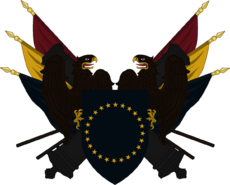Constitution of Carloso
This article is incomplete because it is pending further input from participants, or it is a work-in-progress by one author. Please comment on this article's talk page to share your input, comments and questions. Note: To contribute to this article, you may need to seek help from the author(s) of this page. |
| Constitution of the Federal Republic of Carloso Constitución de la República Federal de Cárloso | |
|---|---|
 | |
| Date effective | 20 June 1956 |
| Author(s) | Emmanuel Sartega |
| Purpose | To replace the Constitution of the Republic of Carloso |
The Constitution of the Federal Republic of Carloso (Spanish: Constitución de la República Federal de Cárloso), commonly referred to simply as the Constitution of Carloso or the 1956 constitution is the fundamental law of Carloso. While it is widely regarded to fall within the tradition of liberal Western democracy, recent amendments have been referred to as illiberal by some commentators.
The Constitution created a system of representative democracy in Carloso, inherited from the previous constitution, but established Carloso for the first time as a federation of administrative provinces rather then a unitary state. While generally categorised as a federal republic, Carloso under the 1956 constitution is often referred to as a 'quasi-federal' or a 'unitary state with a federal spirit', due to the limited powers delegated to the provinces and the supremacy of the central government.